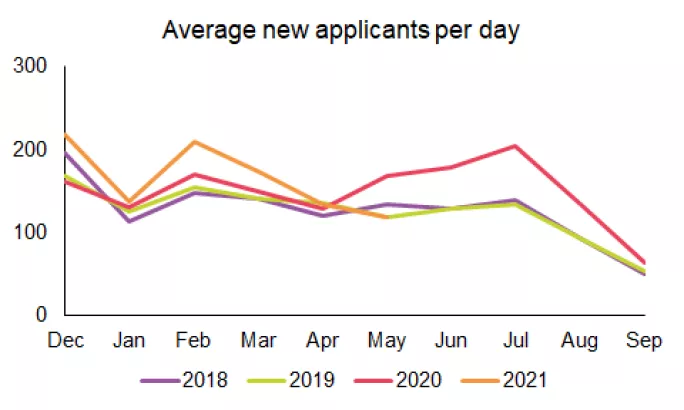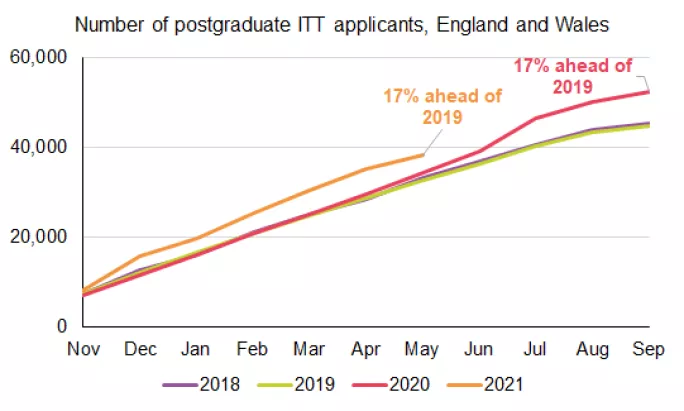Covid surge in ITT applications ‘could be over’

The surge in teacher training applications during the Covid pandemic may now be over as the job market “bounces back”, analysts say.
The Department for Education described a “huge surge” in applications last year as the pandemic took hold, yet the average number of new applicants seeking to join ITT (initial teacher training) courses per day has been at 2018-19 levels for the past two months, according to analysis of data from Ucas (the Universities and Colleges Admissions Service).

Economist Jack Worth, from the NFER (National Foundation for Educational Research), who produced the analysis, said on Twitter: “Is the Covid surge in ITT applications over? I think it might be…If the surge was caused by wider labour market uncertainty, then maybe this is a sign of certainty creeping back?”
Recruitment: Teacher training applications ‘up 65 per cent due to lockdown’
Viewpoint: Why more trainee teachers is good news for everyone
DfE: New teachers’ starting salaries to increase by 5.5 per cent
Is the Covid surge in ITT applications over? I think it might be.
- Jack Worth (NEW ACCOUNT) (@JackWorthNFER) June 9, 2021
Here’s why ?:
Almost exactly a year ago, schools minister Nick Gibb told MPs in the Commons that the number of teacher training applications was up 12 per cent, describing a “huge surge“ in applications towards the end of the second quarter of last year. He said “talented” people from industry were among those expressing interest in plugging the shortage of maths and physics teachers.
Covid: Steadying labour market ‘affecting teacher training applications’
And in September last year, NFER research found that the Covid recession was linked to a 35 per cent year-on-year increase in applications over the previous six months.
Meanwhile, the recent Ucas data shows that the number of postgraduate ITT applications in England and Wales is still higher than last year and in 2019. However, Mr Worth said the figures showed “a recent slowdown”.

Former assistant headteacher Cherie Moore, who works in initial teacher training, responded to Mr Worth’s tweet saying there were a higher number of trainees completing this year who had chosen not to move forward with teaching and were now “actively applying for work in other industries”.
We have a higher number of trainees completing this year who have chosen NOT to move forward with teaching and are actively applying for work in other industries…
- Cherie Moore (@IttMoo) June 9, 2021
Victoria Furness responded to the tweet saying: “I agree based on my experience running a tiny ITT partnership. The slashing of bursaries now seems overconfident.
I agree based on my experience running a tiny ITT partnership. The slashing of bursaries now seems over confident.
- Victoria Furness (@flamingofurness) June 9, 2021
Mr Worth also highlighted how Office for National Statistics job vacancy data shows “a sizeable bounce back” in the labour market.
He told Tes: “The Covid-19 pandemic caused huge disruption and uncertainty within the UK labour market. Because teaching is a relatively secure job, unaffected by short-term economic changes, the wider uncertainty led to a big increase in the numbers of people applying to enter postgraduate teacher training from summer 2020 onwards.
“DfE’s cuts to bursaries for ITT in 2021 are likely to have led to fewer applying this year than otherwise would have, but mostly in the subjects that risked over-recruiting. In spite of the bursary changes, the overall number of applications to ITT in 2021 has remained stronger than in previous years and recruitment remains on course to be healthy in this cycle across almost all subjects. However, the number of new applications coming through has slowed in the last two months, which is perhaps an early sign that the wider labour market is recovering and we are at the start of a period of teaching’s ‘recession-proof’ advantage waning.
“Particularly ahead of the upcoming three-year spending review, this should prompt DfE to consider what additional financial resources, such as pay increases and training bursaries, will be required to maintain adequate teacher supply into the future as the labour market recovers. Covid-19 has provided a short-term boost to teacher supply, but this won’t last indefinitely.
The DfE has been contacted for comment.
You need a Tes subscription to read this article
Subscribe now to read this article and get other subscriber-only content:
- Unlimited access to all Tes magazine content
- Exclusive subscriber-only stories
- Award-winning email newsletters
Already a subscriber? Log in
You need a subscription to read this article
Subscribe now to read this article and get other subscriber-only content, including:
- Unlimited access to all Tes magazine content
- Exclusive subscriber-only stories
- Award-winning email newsletters
topics in this article



